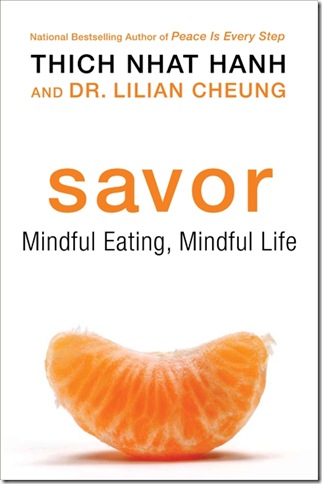Few people have done more to promote the spread of Buddhism in the West than Thich Nhat Hanh, the monk from Vietnam who lives in France and conducts well-attended retreats around the world.
Nhat Hanh has written more than 100 books, most of them revolving around the theme of living mindfully in the moment. Now he has joined with co-author Lilian Cheung, a lecturer at the Harvard School of Public Health, to apply that wisdom to diet and nutrition.
Although Savor does not break new ground, it may prove useful by showing people who struggle with weight gain how the principles of mindfulness can help.
Weight-loss programs, diet books and diet foods are a multi-billion-dollar industry. The authors offer a concise overview of the factors that influence consumption, noting that people are “surrounded by societal forces that drive us to eat more and move less.” The result is weight gain, obesity, and myriad health and emotional problems.
Food companies spend more on advertising than any other industry segment except cars. This bombardment has created a “culture of constant snacking, drinking and eating,” with the result that the percentage of Americans who are overweight or obese is steadily growing.
Savor explains how a core Buddhist teaching known as the Four Noble Truths applies to eating.
The first truth holds that life involves suffering. In this case, being overweight or obese increases the risk of cancer, diabetes, heart disease and premature death. The second truth is that craving, such as a craving for the pleasure found in food and drink, causes suffering. The third truth is that we can address suffering, in this instance by believing we can change negative habits. And the fourth truth lists steps to end suffering, such as setting realistic goals, finding a supportive network of friends, and eating mindfully.
Savor encourages readers to eat slowly to appreciate the gift of nutritious food. The authors suggest trying it with an apple, enjoying each bite, “immersing yourself in the experience 100 percent.”
“We are propelled,” the book says, “by the fast pace of high-tech living – high-speed Internet, e-mails, instant messages and cell phones – and the expectation that we are always on call, always ready to respond instantly to any message we get.”
Nhat Hanh and Cheung recommend a vegetarian or vegan diet, suggesting that readers reduce, if not eliminate, their consumption of meat, fish, chicken and dairy products, including eggs, milk and cheese. They note the staggering environmental toll of meat production, including the release of methane tied to global warming, the destruction of rain forests to expand grain production for farm animals, and the pollution of water and air from animal waste.
Vegetarians and vegans, the book says, tend to be healthier and weigh less than those who consume animal products high in unhealthy fat.
Much of the text covers familiar ground. The authors recommend that people consume more fruits and vegetables, and cover at least half their plates with fruits or vegetables at each meal.
They stress the importance of regular exercise, calling it “about as close to a magic potion as you can get.” Not surprisingly, they note the negative impact of television, tying it to lack of exercise and obesity. Children spend more time watching TV and playing on computers than they do in school.
Unfortunately, the book includes a disturbing Buddhist parable about a young couple crossing the desert with their 3-year-old son. When they run out of food, they decide to eat their son to survive. The story is figuratively supposed to illustrate the suffering caused by mindless consumption. The authors concede that the story “may sound unimaginable, cruel and totally unacceptable.” Then why include such an offensive tale, which adds nothing to the book and likely will repel many readers?
Other than that, Savor is a helpful guide for anyone who cares about diet and weight, with many tips about using mindfulness to stick to a healthy diet.
Bill Williams is a freelance writer in West Hartford, Conn., and a former editorial writer for The Hartford Courant. He is a member of the National Book Critics Circle.
Savor: Mindful Eating, Mindful Life, by Thich Nhat Hanh and Lilian Cheung; HarperOne; 292 pp.; $25.99.
